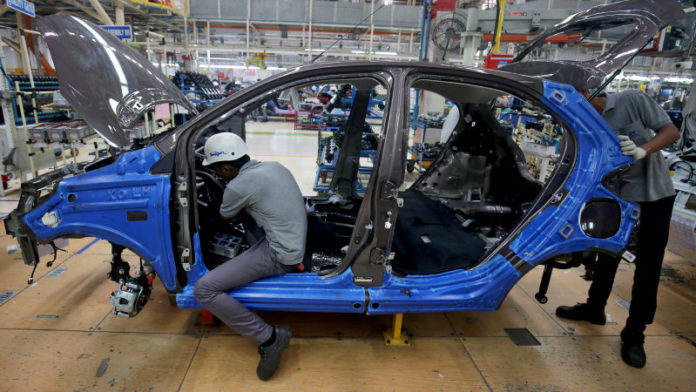This is the first article in a series on the economic slowdown in Karnataka.
For almost two years now, there has been a slowdown in the economy of the country. GDP in the April-June quarter of this financial year grew by only 5%, the lowest in the past six years. According to Goldman Sachs, more than 50% of this economic decline is driven by a decline in consumer demand. Anecdotal evidence shows that consumers across the board are buying less, and everyone seems to be feeling the pinch.
Also read: Karnataka youth demand to address economic slowdown and implement youth manifesto through signature campaign
India’s auto industry, the fourth-largest in the world, has been one of the hardest-hit sectors during this recession. Karnataka, along with Maharashtra, Gujarat, and Delhi, contributes to nearly 1/3rd of vehicle sales in the country. But sales have declined nearly 25% as compared to last year. And despite the common assumption that this is due to the rising popularity of taxi aggregators such as Ola and Uber, reports show that their demand for passenger vehicles has also tapered in FY19. Alarmingly, the auto industry has laid off around 3,50,000 workers just between April and August 2019. That amounts to nearly 5% of Bengaluru’s population.
 This slowdown is clearly visible when one visits Peenya Industrial Area in Bengaluru. Peenya is one of the largest manufacturing hubs in the country, which employs over a million people. The area houses a large number of small and medium-sized factories that make auto parts, machining tools, and engineering components among other products. The slowdown in automobile sales has meant pink slips and mandatory vacation days for many in the area. Contract workers are usually the first to be suspended or let go, but many permanent employees have also been relieved of their jobs. Many employees have had their salaries slashed in half, and employers have had to cut down production days to reduce costs on their end.
This slowdown is clearly visible when one visits Peenya Industrial Area in Bengaluru. Peenya is one of the largest manufacturing hubs in the country, which employs over a million people. The area houses a large number of small and medium-sized factories that make auto parts, machining tools, and engineering components among other products. The slowdown in automobile sales has meant pink slips and mandatory vacation days for many in the area. Contract workers are usually the first to be suspended or let go, but many permanent employees have also been relieved of their jobs. Many employees have had their salaries slashed in half, and employers have had to cut down production days to reduce costs on their end.
Analysis
Part of the reason for this dramatic slowdown is a slew of government policies that have come into being over the last two years, including GST implementation. Small and Medium Enterprises (SMEs) have yet to adjust to the high tax slabs imposed on them with the new GST rates. Finance Minister Nirmala Sitharaman announced a tax cut for corporates on September 20th, but there was no change to the 22% tax rate for SMEs.
There is also the mandatory transition to BS-VI emission norms, which means an increase in production costs and unsold inventory of BS-IV standard inventory in auto dealerships. The deadline for all auto manufacturers to be ready with BS-VI compliant vehicles is April 1st, 2020. By this time, they should have sold all their stock of BS-IV standard vehicles. However, there aren’t yet any guidelines from the government as to how to phase out this stock. Instead, government bodies have been told that they may replace their old vehicles with those that follow the new emission norms. This step should, hopefully, do something to boost the industry.
Some experts also claim that the auto industry is in need of new kinds of employees. With the government’s emphasis on moving towards clean energy and mobility, and the global shift towards the same, automakers need experts in digital technologies, software engineering, and machine learning. There is an overall shift away from mechanical engineering processes and professionals. The job cuts in the industry, therefore, speak to the future of automobiles. However, it doesn’t seem like the demand for these new kinds of jobs will make up for the volume of job losses taking place at the moment.
Whether it’s primarily because of government policies, or the global economic slowdown, the Indian state as well as the Karnataka government need to take action in the form of policies. These policies should be geared especially toward SMEs, who need it the most. Revival of SMEs will give a boost to the economy from the bottom-up.



